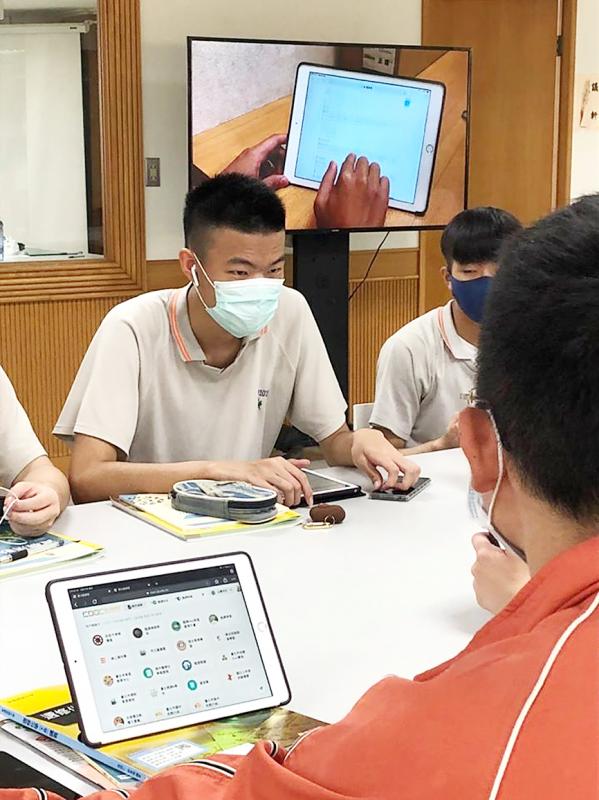The Executive Yuan yesterday unveiled an NT$20 billion (US$719.4 million) digital education initiative that would purchase 61,000 tablets for elementary and junior-high students over the next four years.
Premier Su Tseng-chang (蘇貞昌) signed off on the Ministry of Education program after chairing the weekly Cabinet meeting, Executive Yuan spokesman Lo Ping-cheng (羅秉成) told a news conference after the meeting.
Lo quoted Su as telling the meeting that the COVID-19 pandemic has underscored the importance of remote learning and that children from disadvantaged families are underserved by digital infrastructure.

Photo courtesy of the Taipei City Department of Education
The Elementary and Junior-High Student Digital Learning Enhancement Plan would ensure that every student has a tablet and every classroom has Internet access, Su said.
Tablet distribution would prioritize children in remote areas, Su said, adding that the central government would fully fund the program, which would be implemented before September next year.
The government would team up with the private sector to create digital education materials and would give subsidies to public schools to procure digital materials, he said.
Broadband Internet access would become available at public schools in remote areas so that children there would not be left out of reaping the educational benefits of technology, Su added.
The initiative, funded via the Cabinet’s Forward-looking Infrastructure Development Program, would install 30,900 wireless access points in classrooms across the nation, the ministry said in a news release.
The tablets, which would be distributed with preinstalled study materials and apps, would be in addition to 20,700 educational mobile devices distributed following the outbreak of COVID-19, the ministry said.
Children in remote areas would be the first to receive tablets, while the tablet-student ratio would be 1:6 in the rest of the nation, it added.
Teachers in urban areas would need to use the initiative’s stated criteria in distributing the tablets to students, it said.
Content creators would aim to make the materials more accessible to students and make better use of videos, games, virtual reality and virtual interaction, it added.

The inspection equipment and data transmission system for new robotic dogs that Taipei is planning to use for sidewalk patrols were developed by a Taiwanese company, the city’s New Construction Office said today, dismissing concerns that the China-made robots could pose a security risk. The city is bringing in smart robotic dogs to help with sidewalk inspections, Taipei Deputy Mayor Lee Ssu-chuan (李四川) said on Facebook. Equipped with a panoramic surveillance system, the robots would be able to automatically flag problems and easily navigate narrow sidewalks, making inspections faster and more accurate, Lee said. By collecting more accurate data, they would help Taipei

STATS: Taiwan’s average life expectancy of 80.77 years was lower than that of Japan, Singapore and South Korea, but higher than in China, Malaysia and Indonesia Taiwan’s average life expectancy last year increased to 80.77 years, but was still not back to its pre-COVID-19 pandemic peak of 81.32 years in 2020, the Ministry of the Interior said yesterday. The average life expectancy last year increased the 0.54 years from 2023, the ministry said in a statement. For men and women, the average life expectancy last year was 77.42 years and 84.30 years respectively, up 0.48 years and 0.56 years from the previous year. Taiwan’s average life expectancy peaked at 81.32 years in 2020, as the nation was relatively unaffected by the pandemic that year. The metric

TAKING STOCK: The USMC is rebuilding a once-abandoned airfield in Palau to support large-scale ground operations as China’s missile range grows, Naval News reported The US Marine Corps (USMC) is considering new sites for stockpiling equipment in the West Pacific to harden military supply chains and enhance mobility across the Indo-Pacific region, US-based Naval News reported on Saturday. The proposed sites in Palau — one of Taiwan’s diplomatic allies — and Australia would enable a “rapid standup of stored equipment within a year” of the program’s approval, the report said, citing documents published by the USMC last month. In Palau, the service is rebuilding a formerly abandoned World War II-era airfield and establishing ancillary structures to support large-scale ground operations “as China’s missile range and magazine

Passengers on Taiwan High Speed Rail (THSR) will be required to use headphones and make phone calls in gangways under new “quiet travel” rules starting Sept. 22. THSR Chairman Shih Che (史哲) told media that THSR will run a three-month promotional campaign to ensure widespread adoption of the new rules. Those repeatedly ignoring the guidance face the potential termination of their transport contract, which can result in them getting escorted off the train, according to THSR. Shih shared his hope to cultivate an environment conducive to rest and reading for the train’s passengers, stating that these changes aim to “promote self-discipline” among passengers